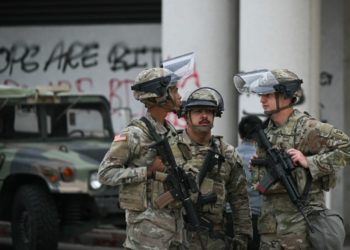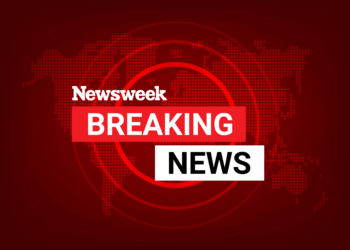Donald Trump is talking and acting like an authoritarian as he escalates a constitutional clash with California over his migration crackdown.
Much now depends on whether he’s simply talking tough or if he’s ready to take an already-tense nation across a fateful line in his zeal for strongman rule.
In a mind-boggling moment, on Monday, the president of the United States — the country seen as the world’s top steward of democracy for 80 years — endorsed the arrest of the Democratic governor of the nation’s most populous state.
“I think it would be a great thing,” Trump, the only convicted felon ever to serve as president, told reporters as he strode across the South Lawn of the White House.
Later, Trump deployed hundreds of active-duty Marines to Los Angeles and authorized the arrival of 2,000 more National Guard reservists after a weekend of unrest that saw clashes with police and burning cars in contained areas of the city. The protests were triggered by Immigration and Customs Enforcement sweeps seeking undocumented migrants in a city and state that are epicenters of Democratic power.
California and Los Angeles officials reject Trump’s claims that they have lost control. On Monday evening, law enforcement officers pushed back demonstrators throwing projectiles with flash bangs.
Trump’s decision to deploy troops despite the opposition of California Gov. Gavin Newsom represented the latest example of his willingness to flex extraordinary executive power — often on questionable grounds — and marked a break with a first term when he was often talked out of his extreme impulses by establishment officials.
For all Trump’s multiple previous challenges to the rule of law and democracy, a grave new chapter may be opening.
“The president is forcibly overriding the authority of the governor and mayor and using the military as a political weapon. This unprecedented move threatens to turn a tense situation into a national crisis,” Rhode Island Sen. Jack Reed, the top Democrat on the Armed Services Committee, said on Monday evening. “Since our nation’s founding, the American people have been perfectly clear: we do not want the military conducting law enforcement on US soil,” Reed said in a statement.
California Democratic Rep. Nanette Barragán, whose district encompasses Paramount, just south of Los Angeles, condemned Trump’s mobilizations of troops that she said were not justified by the situation. “This is where I think this is a sign of a dictator,” she told CNN’s Jake Tapper. “And the threat he is making against the governor to arrest him — I mean come on — that is pretty outrageous.”
Trump border czar tells CNN that Democratic claims about troops are ‘ridiculous’
Top Trump administration officials are throwing around words like “insurrection.” Not surprisingly, many observers have taken such rhetoric as a sign the White House is prepared to invoke the Insurrection Act — a law that would allow the president to activate troops to put down a rebellion in a state. There is no such revolt in California. Trump’s claims on Monday that his swift action stopped Los Angeles being obliterated are also not true.
The president’s border czar Tom Homan, meanwhile, told CNN’s Kaitlan Collins that claims by Democratic officials that protests intensified because Trump sent National Guard troops were “ridiculous.” Joining “The Source” from Los Angeles, Homan said, “It all depends on the activities of these protesters— I mean, they make the decisions.”
Protesters gathered in large numbers in Los Angeles on Monday night, raising the prospect of another cycle of tension and uncertainty.
The trajectory of the crisis could now turn on whether Trump follows through on his dictator’s theatrics by crossing lines not approached by modern presidents — notably on the use of troops in a law enforcement capacity.
It may also rely on the restraint of protesters, who would play into Trump’s hands by taking part in more unrest that creates alarming television pictures that can fuel Trump’s dystopian rhetoric.
Creating or escalating a law-and-order crisis or threat to public security and then using it to justify the use of the military on domestic soil would mirror the methodology of tyrannical leaders throughout history.
And hopes of restraint are hardly supported by Trump’s second term so far.
The president has, for instance, invoked highly contentious national emergencies on immigration and trade to unlock rarely used executive powers with no pushback from the Republican Congress. He’s used presidential authority against what he regards as centers of liberal authority and influence: at Ivy League universities, in the federal government and in the media. And even in his breakup with erstwhile DOGE chief Elon Musk last week, Trump threatened yet another abuse of power by cancelling federal subsidies for the SpaceX boss’s firms.
The administration is spoiling for a fight as it lays down a marker in California for other Democratic states where leaders are loath to cooperate with Trump’s deportation purge. It obviously also perceives a political advantage in the president positioning himself as the guardian of public order in a way that allows Republicans to accuse Democrats of defending softer immigration enforcement.
Is Trump for real or is he bluffing?
But as ever with Trump, there’s a question as to whether he’s serious with his threats or is staking out an extreme position to please his voters or even to create some perceived leverage for himself.
Homan, for instance, told CNN’s Collins that Newsom had “absolutely not” done anything at this point to justify his arrest.
And North Dakota Republican Sen. Kevin Cramer adopted the classic GOP line that not everything that the president says should be taken literally when asked about administration threats to detain Newsom. “You guys could ask every day if I am comfortable with what he said. He hasn’t arrested him. I can’t imagine that he is going to arrest Gavin Newsom,” Cramer told CNN’s Manu Raju.
Cramer also voiced the view of many Republicans that, far from behaving like an authoritarian, Trump is rightfully addressing failures by Democratic leaders on immigration policy and public order. “There’s no question about it: Places like California have thumbed their noses at the American people and decided they want to be sanctuary for criminals,” Cramer said.
So far, National Guard reservists mobilized by the president over the head of a state governor for the first time since the Civil Rights era in the 1960s have mostly been used to defend federal buildings in Los Angeles. While the announcement of a deployment of Marines to the city was superficially alarming, their orders prohibit them from conducting law enforcement activities like making arrests without Trump invoking the Insurrection Act. The Marines are expected to be used to bolster National Guard members on the ground while up to 2,000 reservists are mobilized.
CNN’s Evan Perez, meanwhile, reported on Monday evening that while officials like top White House aide Stephen Miller have been talking about an “insurrection,” administration lawyers have been working to craft a much less confrontational way of protecting the federal government’s ability to carry out immigration enforcement, hoping to avoid further inflaming the situation, according to multiple people briefed on the discussions.
This may all signify that the president is not yet ready to push the nation toward an unprecedented authoritarian cliff — even if his personal history, not least over January 6, 2021, suggests that in the heat of the moment he often takes the most reckless course.
And Trump may be playing with fire in a city and state where anger over his wild four-month-old presidency is boiling. By inserting troops into such a volatile and tense environment, he’s opening the possibility that flashpoints could ignite and even that tragic circumstances could unfold.
But then again, maybe that’s the point, if the president is seeking a predicate to deploy active-duty troops on the streets of American cities.
Another troubling omen is that Newsom — who, like Trump, relishes public fights — has no incentive to cave to the man he would like to replace as president in 2029.
Newsom, for example, wrote on social media on Monday that the president was deploying another 2,000 National Guard troops to Los Angeles, even though only 300 from his initial 2,000-strong contingent had so far arrived in the city. “This isn’t about public safety. It’s about stroking a dangerous President’s ego,” the governor said. “This is Reckless. Pointless. And Disrespectful to our troops.”
The state has sued the administration over that initial call-up of reservists. State Attorney General Rob Bonta called Trump’s federalization of the state’s National Guard troops “unnecessary, counterproductive, and most importantly, unlawful.”
The suit created yet another legal morass around one of Trump’s most aggressive power grabs. California has now lodged 24 lawsuits against the administration in 19 weeks.
With every day that passes in the California public order crisis, the political incentives seem to be driving toward more confrontation rather than a peaceful resolution.
But ultimately it’s up to Trump how this ends.
The post Trump is acting like an authoritarian; California’s crisis now rests on what he does next appeared first on CNN.




